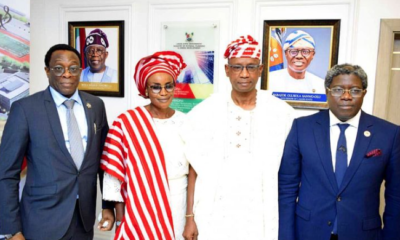Education
NITDA Trains Over Two Hundred Children In Emerging Technologies


At the recently finished Science, Technology, Engineering, and Mathematics (STEM) Boot Camp for Kids (SB4KIDS) in Abuja, Nigeria, the National Information Technology Development Agency (NITDA) trained 282 children in new technologies.
Read Also: Lagos Lawmaker, Adebola Shabi Distributes School Bags To 350 Students
SB4KIDS is a NITDA effort that coaches and inspires young people to pursue a passion for science, technology, engineering, and mathematics, as well as to develop an early interest in digital and new technologies.
The training, which was conducted by the National Centre for Artificial Intelligence and Robotics (NCAIR), a subsidiary of NITDA, included practical lessons in robotics, artificial intelligence, coding, and virtual reality, among other topics, with the goal of increasing digital inclusion.
It was also intended to catch youngsters when they were young in order for them to be familiar with emerging technologies, which are a tool in today’s global economic revitalization.
In a message to the children, Mr. Kashifu Inuwa, Director General of NITDA, represented by Mr. Aristotle Onomo, Director of Corporate Planning and Strategy, exhorted them to explore the digital environment, noting that there are no barriers in the digital domain.
He explained that “the training is for the enhancement of their talents and creativity for the development of the future.”
He mentioned that the program was held in Jigawa State (North West), Port Harcourt (South-South), and Abuja, the Federal Capital Territory, all at the same time.
While encouraging the children to enhance their talents for the industrial revolution, Inuwa warned them not to abuse the internet.
“Always follow your intuition and make sure your parents are aware of what you are doing.” Positively apply your information.”
The NITDA chief also advised parents to supervise their children’s internet use to ensure that the proper aspects of it are implemented and that they improve.
Engr. Garba Ya’u, Director, the National Centre for Artificial Intelligence and Robotics NCAIR, represented by Mr. Babangida Gilo, further stated that the children were pursuing 3D printing and Robotics, Internet of Things IoT, Digital Communication, Drone operations, and Embedded systems, among other things.
He challenged the pupils to “complement what they have learned during the training within the two weeks of insensitive coaching by being more creative.”
Some of the participants, like Brown Zowe and Elizabeth Bassey, told Voice Nigeria that the training increased their knowledge of robotics and drones.
Deserving pupils received awards for their great efforts.
Education
Shettima Launches NEDC-ASSEP Programme To Address School Dropouts In North East


Vice President Senator Kashim Shettima yesterday launched the Accelerated Senior Secondary School Education Programme (ASSEP) initiated by the North-East Development Commission (NEDC) in collaboration with the Vice President Office to reduce the number of post-primary dropouts due to the decline in secondary school enrollment in the subregion which stands at 15 percent, one of the lowest in the country.
Read Also: NLC Shuts Down IBEDC Premises Over Electricity Tariff Hike
The managing director/CEO of the commission, Alh Mohammed Alkali said the Stabilisation and Development Master Plan (NERSDMP) developed by the North East Development Commission and its diverse partners consists of pillars that support human capital development in the subregion which caters for both human capital facilities – infrastructure, teaching/learning material, etc – estimated to cost over N1 trillion.
Alkali made the remark at the launching of the Accelerated Senior Secondary School Education Programme (ASSEP) performed in Bauchi on Saturday by the vice president.
ASSEP seeks to boost the post-primary education rating across the subregion through three major objectives – improved enrolment into tertiary institutions, skills development and elevation of teacher quality.
Alh Alkali assured that the commission is poised to develop and support the children and youth of the Northeast subregion to grow, develop and compete with the best across the world in various fields, excel and contribute to further development of the six states, subregion and country as a whole.
The managing director expressed gratitude to the federal government, especially the vice president, for the deep interest and commitment to human development in the North-East, saying they would be counting on the continued support of state governments, federal government as well as other partners.
Alkali disclosed that the commission has also plowed other funds into human capital training and retraining programmes that could propel socio-economic development of the subregion, saying “This underscores the premium we place on building our people and their capacity to make concrete social and economic contribution.
“Therefore, the Accelerated Senior Secondary Education Programme (ASSEP) we have gathered here to launch today is an intervention focused on addressing a particular challenge in our region’s education system; it will provide effective support where the capacity of conventional schooling arrangements is limited for our teeming beneficiaries.”
He attributed this to the challenges in the post-primary education segment, citing JAMB/UTME applications and admissions into tertiary institutions in 2019 where northeast students’ performance was one of the poorest in the country.
He further noted that nationally, the North-East subregion has the lowest number of teachers and the highest percentage (55 percent of those available) are without literacy skills.”
Vice President Shettima had earlier launched the programme regretting that post primary enrolment in the Northeast is 19 percent which is far below the national average of 39 percent.
Education
Oyo State Governor Approves Recruitment of 7,000 Primary School Teachers


Governor Seyi Makinde of Oyo State has approved the recruitment of 7,000 teachers into public primary schools in the state.
The government also approved the recruitment of 100 caregivers in special schools across the state.
Read Also: Osun State: NNPP Vows To Unseat Adeleke In 2026
Nureni Adeniran, the Oyo State Universal Basic Education Board (SUBEB) chairman, disclosed this in Ibadan on Friday at a news conference.
Mr Adeniran said this was in fulfilment of Mr Makinde’s electioneering promise and fulfilment of the yearnings of the people of the state.
He explained that the recruitment process would commence soon, urging intending applicants to be wary of scammers who defraud unsuspecting members of the public.
Mr Adeniran said information regarding the recruitment exercise would only emanate from the board, adding that no authorization had been given to a third party to act on behalf of the government or the board.
The SUBEB boss said the intending applicants would not pay any amount to anybody on account of the recruitment.
“This press conference is the first stage of the recruitment process; the next stage will be made known as well as the requirements.
“The board will comply with the directive of the governor that the exercise will be conducted based on merit,” Mr Adeniran said.
He, however, urged intending applicants to apply based on their local government areas, adding that teachers would be posted to teach there.
According to him, it will solve the problem of having to transfer teachers later and ensure that every local government is adequately catered for.
He said the recruitment would address about 70 per cent of the manpower shortage.
He added that the exercise would be inclusive, with special consideration for persons with disabilities.
(NAN)
Education
Kwara State Government Issues Stern Warning to School Principals Over Illegal Charges


The Kwara State Government has cautioned principals of Junior Secondary Schools and head teachers of primary schools throughout the state against imposing unlawful fees for the state placement examination (Common Entrance).
Read Also: I Have No Hand In Shaibu’s Impeachment – Ighodalo
Hajia Sa’adatu Modibbo Kawu, the state Commissioner for Education and Human Capital Development, delivered the warning on Tuesday from her office in Ilorin.
She stressed that the common entrance examination is free of charge and firmly stated that the government will not tolerate any form of extortion from pupils under any pretext, as the examination is fully funded by the state government.
Hajia Modibbo Kawu urged school principals and head teachers to refrain from engaging in activities that could tarnish the reputation of the state government.
Additionally, she cautioned against involvement in or condoning examination malpractices, asserting that the current administration has a zero-tolerance policy towards such acts.
The commissioner encouraged parents and guardians to promptly report any principal or head teacher suspected of engaging in questionable activities directly to her office, reiterating that her office is open to all concerned parties.
-



 Entertainment1 year ago
Entertainment1 year agoThe Story Of A Woman With Unusual Long Backside, Sarah Baartman
-



 Entertainment1 year ago
Entertainment1 year agoTallest Man In Nigeria Afeez Agoro Cries Out To Nigerians For Financial Support After Chronic Arthritis Diagnosis As SFCOBA 94Set Pays Him Visit
-



 Business2 years ago
Business2 years agoNigeria Vs Ghana: Authentic Nigeria Football and Allied Sports Supporters Club Seals Sponsorship Deal with 86Z Football Technology Limited Foots
-



 Education2 years ago
Education2 years agoTokunbo Wahab: An uncommon legal eagle soaring daily to a greater place in history
-



 News8 months ago
News8 months agoPhysical Planning Commissioner, Oluyinka Olumide Assumes Office …Harps On Transparency, Zero Tolerance To Building Collapse
-



 Featured1 year ago
Featured1 year agoBuruj Football Club’s Players Moving To Europe Delights Obesere
-



 Sports11 months ago
Sports11 months agoVictor Osimhen Returns To Roots As Football Superstar Visits Primary School And Inspires Young Talent
-



 Featured2 years ago
Featured2 years agoQatar 2022 World Cup Playoff: Black Stars Hold Eagles To Scoreless Draw In Kumasi




